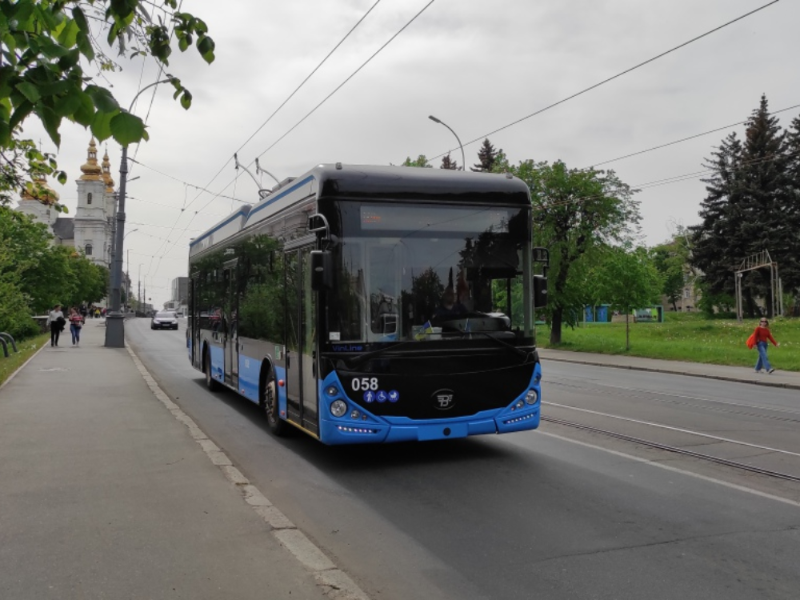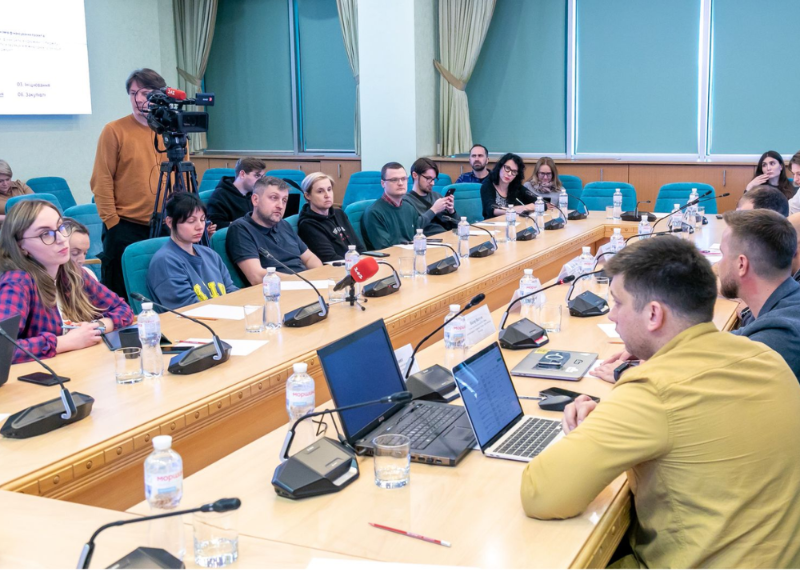
Resolution of the Lviv Urban Mobility Forum,
Lviv, April 26-28, 2023,
Preamble
On April 26-29, 2023, the Ukrainian Urban Mobility Forum was held in Lviv. The event was organized by the team of the Department of Urban Mobility and Street Infrastructure of the Lviv City Council in cooperation with the NGO “Vision Zero”, within the framework of the project “TUMIVolt - Urban Mobility from Renewable Energy Sources”, implemented by the Deutsche Gesellschaft für Internationale Zusammenarbeit (GIZ) GmbH and funded by the Federal Ministry for Economic Cooperation and Development of Germany. The event was attended by more than 150 representatives of city councils, businesses, and NGOs from Ukraine and abroad. The event became a platform for dialogue between representatives of central and local governments, experts in the field of urban mobility, transport and infrastructure, business and NGOs. Participants exchanged experiences, learned best practices, and agreed on next steps. The outcome of the forum is this Resolution.
Barrier-free street and transportation infrastructure
1. Barrier-free cities and transportation infrastructure is a strategically important common humanitarian goal. Cities, urban and intercity transport should function in a coordinated manner and be accessible to people with limited mobility.
2. The forum participants support the state's goals to achieve barrier-free access, as set out in the National Strategy for Creating Barrier-Free Space in Ukraine, and are already taking steps to conduct a barrier-free audit and improve the accessibility situation. However, achieving barrier-free cities, transport infrastructure, and transport services requires meaningful cooperation and assistance at the level of state executive authorities and state-owned enterprises.
3. The forum participants consider it critical to ensure the barrier-free accessibility of railway stations as key transportation hubs. City councils are ready to cooperate with Ukrzaliznytsia in this direction to make platforms, station buildings and station squares, public transport stops, parking spaces and other infrastructure elements barrier-free, and expect open and active cooperation from Ukrzaliznytsia, as well as appropriate state funding for design and construction work.
City public transportation
4. Ukraine should implement the European Commission Directive 1370/2007 as soon as possible in accordance with paragraph 1875 of the EU-Ukraine Association Agreement (on public passenger transport services by rail and road). This will enable cities to move to a modern and sustainable system of procurement of transportation work instead of the outdated and inefficient system of tenders for bus routes. The drafts of the relevant Laws of Ukraine were registered in the Verkhovna Rada under No. 5149 of 25.02.2021, No. 5150 of 25.02.2021, No. 5151 of 25.02.2021, No. 5152 of 25.02.2021, No. 5185 of 02.03.2021, but they have not been considered by the Verkhovna Rada for more than two years.
5. Public transport and urban mobility in general should be the subject of attention by the legislative and executive authorities and take an important place in public policy, in accordance with the documents and best practices of the European Union. The Committee on Transport and Infrastructure of the Verkhovna Rada of Ukraine should resume including draft laws on urban mobility in the agenda of its meetings, and the Ministry of Infrastructure should be empowered to develop and implement state policy to promote sustainable urban mobility, including public transport, cycling, and road safety.
6. Cities are experiencing a staffing crisis in public utilities, with a particularly severe shortage of drivers and technicians in public transportation. The new Russian invasion of Ukraine in 2022 has exacerbated this problem; for example, the Vinnytsia Transport Company has mobilized more than 100 employees into the Armed Forces of Ukraine. The staffing crisis means that the new rolling stock will have no one to operate and no one to maintain it. Cities will not be able to solve this problem without legislative changes, in particular, to the system of financing public transport, driver training, etc. State support for vocational education in public transport is also needed.
7. The Forum participants consider the Law of Ukraine “On Certain Issues of the Use of Vehicles Equipped with Electric Engines and Amendments to Certain Legislative Acts of Ukraine on Overcoming Fuel Dependence and Development of Electric Charging Infrastructure and Electric Vehicles” in terms of quotas for electric buses in the procurement of rolling stock after 2024 to be unrealistic and insensitive to the situation in cities and the urban public transport industry in general, and one that does not take into account the need to update and develop the existing bus fleet. For many routes and settlements, high-quality bus service today will have a better environmental impact than a small number of electric buses in a few years. The provisions of this Law should be improved and supplemented by further legislative changes.
8. The government should recognize that electric public transport as a sector of the economy has significant potential for Ukraine's post-war recovery and integration into the EU. Ukrainian battery buses, trolleybuses and trams, and railway rolling stock can be competitive in domestic and foreign markets, bringing tax payments, quality jobs, innovative technological development, and export revenues to the state. Ukraine has the capacity to produce more than 1,000 buses, trolleybuses, and trams a year, but only a few dozen are produced. At the level of government policy and municipal procurement policies, it is advisable to prioritize Ukrainian producers and ensure a percentage of localization.
9. Deregulation of urban transport infrastructure: in cooperation between municipalities and state authorities, based on EU best practices, numerous obstacles to the development of electric public transport should be eliminated, including legal provisions (e.g., the need to conduct an environmental impact assessment for tram lines when such an assessment is not required for roads, the prohibition of tram and trolleybus traffic across railway crossings where buses are allowed), state building codes and state standards The DBN and DSTU should be reformed in Ukraine to remove outdated regulatory requirements that do not exist in EU countries. In the best case scenario, these norms should be converted to a parametric approach, specifying criteria for the final result rather than requirements for technical parameters (e.g., the regulatory requirement of a minimum distance of 20 meters from the tramway to the nearest residential buildings should be replaced by a requirement for the maximum permissible level of noise and vibration in residential buildings caused by tram traffic). It is also important to deregulate pricing and provide benefits for the use of public transportation.
10. Tax incentives for public transport. The forum participants propose to consider abolishing or reducing VAT on rolling stock and public electric transport infrastructure, in particular, exempting from VAT purchases made with the involvement of international financial organizations. This will allow cities to upgrade rolling stock and electric transport infrastructure more quickly, which is a very significant need. An important component of sustainable financing of urban passenger transportation is the restoration of the state subvention to compensate for public transportation privileges introduced by the state.
11. Low and zero emission zones in cities. Amendments to the Law of Ukraine on Local Self-Government, the Law of Ukraine on Road Traffic, and legislation regulating mechanisms for recording violations are needed to allow cities to plan and implement low-emission zones, following the example of cities in the European Union.
Road traffic safety
12. Planning before design. For infrastructure projects (roads, streets, bridges, tunnels, stations), a feasibility study should be included as a mandatory stage that precedes design. Amend legislation and regulations. The planning stage of infrastructure projects should include several new planning tools (in addition to the existing feasibility study): pre-feasibility study, transport concept, road safety impact assessment, and stakeholder consultations.
13. The speed factor is the number one problem. Decisive measures should be taken to reduce excessive speed as a key factor that causes most road accidents with victims in Ukraine, in particular eliminate or reduce the tolerance threshold, which is currently 20 km/h, which is not in line with the practices of any EU country; introduce changes to speeding fines with a progressive increase in the amount of the fine for every 10 km/h; start developing a penalty point system to positively influence the smaller part of drivers who cause most of the problems and for whom monetary sanctions (fines) are not a deterrent.
14. Continue decentralization in the field of traffic management. The Law of Ukraine “On Road Traffic” already defines the responsibility of local authorities for road safety in communities, and the Law of Ukraine “On Roads” defines the need for road safety audits and the qualification requirements for auditors. However, there is no regulation of road safety audits on roads within the boundaries of settlements, and there is still duplication in the form of the requirement to simultaneously approve changes to traffic management by patrol police, which do not always have the necessary qualifications on the ground. Thus, the field of activity of qualified experts who have passed the relevant certification is more limited than the powers of regional patrol police units that do not have the relevant qualification requirements.
Transport integration of cities with suburbs
15. Inter-municipal cooperation. Develop the legislative framework for inter-municipal cooperation - update the Law of Ukraine “On Cooperation of Territorial Communities” as it is outdated and does not reflect the decentralization reform that took place later (creation of amalgamated communities). Over the 9 years of the law's existence, not a single large city has concluded an agreement with neighboring communities on inter-municipal cooperation, which indicates that the law is ineffective.
16. Law on agglomerations. Start drafting a specialized law on urban agglomerations, based on the example of EU countries, which will allow organizing effective cooperation between large cities and surrounding communities in the sector of transport services, infrastructure development and other services.
Cycling and micromobility
17. To empower the Ministry of Communities, Territories and Infrastructure Development of Ukraine: To amend the Resolution of the Cabinet of Ministers of Ukraine No. 460 “On Approval of the Regulation on the Ministry of Community Development, Territories and Infrastructure of Ukraine” of June 30, 2015, in terms of the Ministry's powers regarding the formation and implementation of state policy in the cycling and light personal transport sector.
18. Complete the work on the National Bicycle Strategy of Ukraine, a draft of which was developed by representatives of civil society with the participation of cities in 2019-2021. The need to develop bicycle infrastructure and government support for this development has only increased as a result of the full-scale war.
19. Consider amendments to customs and tax legislation to exempt electric micromobility vehicles such as scooters and electric bicycles from import duties and VAT, following the example of private electric cars. Electric cars create congestion and take up urban space to the same extent as non-electric cars. Micromobility vehicles, on the other hand, do not.
20. Amend the Traffic Rules to detail the rules for the movement of light personal vehicles and amend the rules for cyclists, the draft of which has been developed by civil society.
21. Provide for the construction of bicycle paths as part of the construction of public roads of I and II categories.
Deregulation of parking
22. Amend the Resolution of the Cabinet of Ministers of Ukraine No. 1342 “On Approval of the Rules for Parking of Vehicles” of December 3, 2009 and the Resolution of the Cabinet of Ministers of Ukraine No. 1306 “On Traffic Rules” of October 10, 2001 and allow parking closer than specified in the restrictions, if it is provided for by the current traffic management scheme, does not impede traffic and does not violate the safety of road users, namely to allow for reduced distances from public transport stops, pedestrian crossings, entrances to adjacent territories, railroad crossings, solid waste sites, etc.
23. Develop separate State Building Standards for on-street parking, taking into account European experience, as currently, standards for the construction of multi-level garages (DBN B.2.3-15:2007 “Parking lots and garages for passenger cars”) are used to organize on-street parking.
24. Amend the Resolution of the Cabinet of Ministers of Ukraine No. 258 “On Approval of the Procedure for Setting Tariffs for Services for the Use of Paid Parking Areas” of March 2, 2010, as the current pricing does not take into account modern approaches to parking organization (in particular, introduce a paid load factor, allow dynamic pricing, etc.)
Railway transport
25. Create the possibility of transferring railways and stations to the balance sheet or operation of communities, in particular, in the form of public-private partnerships. This should make it easier for local governments to invest in rail transport, not only in urban and suburban passenger transport, but also in the overall rail transport infrastructure located within communities.
26. Amendments to the Law of Ukraine “On Railway Transport”: Create the possibility of combining the arrival and departure schedules of railway transport with urban public transport. Provide local authorities with the opportunity to influence the distribution of railway transport capacity in such a way as to synchronize different modes of transport with each other for more efficient passenger transportation, in particular, by moving to a procedure for the procurement of public passenger transportation services by rail and road.
Following the Forum, the text of the resolution was formulated by the members of the organizing committee:
Orest Oleskiv (Transport Administration, Department of Urban Mobility and Street Infrastructure of Lviv City Council) Pavlo Syrvatka (Street Infrastructure Administration, Department of Urban Mobility and Street Infrastructure of Lviv City Council) Marta Pastukh, (Gesellschaft für Internationale Zusammenarbeit GmbH (GIZ), Viktor Zagreba, (NGO “Vision Zero”).
As a reminder, the All-Ukrainian Mobility Forum was held in Lviv on April 26-28, 2023. It brought together more than 100 experts in the field of sustainable urban mobility. We wrote more about the event in one of our previous publications. The purpose of the event was to share knowledge, experience, and formulate further coordinated plans for the development of urban mobility. As a result of the event, a resolution was adopted by the participants. The resolution consolidated theses on the main problems related to sustainable urban mobility in Ukrainian cities.


 During the visit, meetings were held with relevant heads of local self-government bodies and communal enterprises, in particular: with the director of the KP "Vinnytsiakartservice" Kateryna Babina, the director of the Department of Transport and Urban Mobility Andriy Sorokin, the head of the KP "Agency of Spatial Development" Maksym Kravchuk and acting Volodymyr Dudko, head of the technical department of KP "Vinnytsia Transport Company".
During the visit, meetings were held with relevant heads of local self-government bodies and communal enterprises, in particular: with the director of the KP "Vinnytsiakartservice" Kateryna Babina, the director of the Department of Transport and Urban Mobility Andriy Sorokin, the head of the KP "Agency of Spatial Development" Maksym Kravchuk and acting Volodymyr Dudko, head of the technical department of KP "Vinnytsia Transport Company".  Based on the results of these meetings, they learned about the stages of the implementation of the "electronic ticket" project (that is, the introduction of an automated system of payment and passenger registration) in all public transport in Vinnytsia. At the announced tender, the Czech company "Mikroelektronika" won at one time with an offer of 5 million euros. As of now, about 500 vehicles are equipped with validators and POS terminals. Payment can be made by transport and bank cards, as well as cash + transfer available 30 minutes. in case of payment by transport card.
Based on the results of these meetings, they learned about the stages of the implementation of the "electronic ticket" project (that is, the introduction of an automated system of payment and passenger registration) in all public transport in Vinnytsia. At the announced tender, the Czech company "Mikroelektronika" won at one time with an offer of 5 million euros. As of now, about 500 vehicles are equipped with validators and POS terminals. Payment can be made by transport and bank cards, as well as cash + transfer available 30 minutes. in case of payment by transport card.  In addition to everything else, Vinnytsia is known for its Swiss "Mirage" trams, which the city received free of charge from the city of Zurich. They are used, but in good enough condition for transportation. They are the basis of the rolling stock of trams in Vinnytsia. It also became known that the city of Zurich will provide Vinnytsia with 16 Tram2000 model cars in 2023 as part of agreements to improve transport services during a full-scale war. In addition, KP "VTK" continues to improve its own "VinWay" trams, which have already proven themselves well.
In addition to everything else, Vinnytsia is known for its Swiss "Mirage" trams, which the city received free of charge from the city of Zurich. They are used, but in good enough condition for transportation. They are the basis of the rolling stock of trams in Vinnytsia. It also became known that the city of Zurich will provide Vinnytsia with 16 Tram2000 model cars in 2023 as part of agreements to improve transport services during a full-scale war. In addition, KP "VTK" continues to improve its own "VinWay" trams, which have already proven themselves well.










